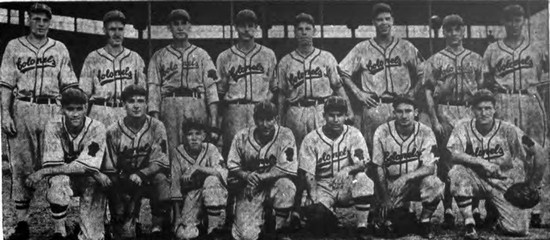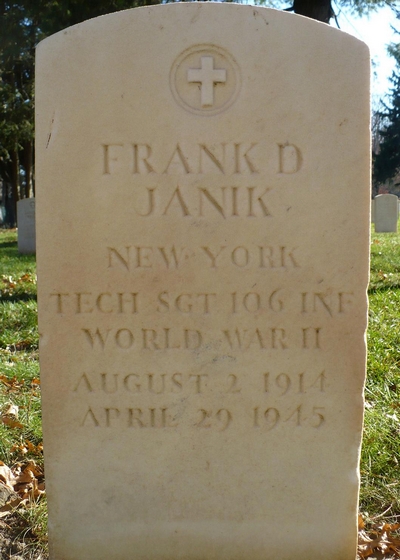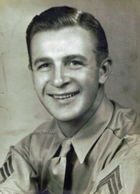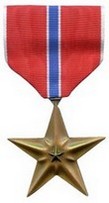Frank Janik
| Date and Place of Birth: | August 2, 1914 Cheektowaga, NY |
| Date and Place of Death: | April 29, 1945 Okinawa |
| Baseball Experience: | Minor League |
| Position: | Catcher/Outfield |
| Rank: | Technical Sergeant |
| Military Unit: | Company F, 106th Infantry Regiment, 27th Infantry Division US Army |
| Area Served: | Pacific Theater of Operations |
Frank D. Janik was born in Cheektowaga, near Buffalo, New York on
August 2, 1914. Originally a shortstop, Janik converted to catcher while
playing amateur baseball in Buffalo and helped his team win local
pennants in 1934 and 1935, batting .463 and .424. In 1936 he organized
his own semi-pro team in Cheektowaga, using the finest players from
Buffalo's independent ranks, and serving as captain and manager. Entered
in the Buffalo Evening News League, he steered Cheektowaga to 18
victories in 20 games. The team won the Western New York championship
but were defeated in their state title bid in a gruelling 11-inning
contest that was won by Sherill, 1-0. Janik batted .403 that season with
11 home runs.
In 1937, Janik began the season with Cheektowaga before signing as a
catcher with the Rome Colonels; a new entry in the Class C
Canadian-American League. In 76 games he batted .265 with 10 home runs
and 42 RBIs. The 5-foot-10, 170-pound slugging catcher had quickly
become a fan favorite and when Bill Buckley took over as Colonels'
manager in 1938, they did not hesitate in showing their dissaproval of
Janik being left out of the starting line-up. "On opening day [the fans]
continually pleaded with [Buckley] to use [Janik] as a pinch hitter,"
reported the Utica Daily Press on May 20, 1938. "They resumed their
pleas yesterday, with more emphasis, until finally the manager let Janik
bat for [Hal] White." Janik responded with a home run that started a
three-run eighth inning rally and a 5-4 Colonel victory over the
Gloversville Glovers.
Shifting to center field and hitting in the number three spot for the
Colonels for the rest of the season, the 23-year-old batted an
impressive, team-leading .313 in 110 games with 21 home runs and 78
RBIs. In June 1938, he emerged in spectacular style from a brief slump
at the plate, collecting 11 hits in three days.
A bright future appeared to be ahead of the young ballplayer and in
1939, Rome's new manager, Admiral Martin, was keen to get Janik to sign.
Janik was working during the off-season at the Rome Cable Corporation
and still hadn't signed his contract by early-May (Janik took spring
training with the Rome Cable ball team). Martin and Janik, eventually
agreed terms on May 12, but an
injury-shorterned season saw his average drop to .219 in just 24
games. "Rome Colonels suffered a blow with the news that Frank Janik,
power-hitting outfielder will probably be out for the season," reported
the Oswego Palladium-Times on June 1, 1939. "In addition to a
dislocation of the right ankle, Janik suffered a fracture of a small
bone in the leg when sliding into second base against Utica Tuesday [May
30]." He did not return to the line-up until August 27.
In 1940, Janik, who was now living in Rome and was engaged to a local
girl, bounced back and hit .297 for the Colonels in 120 games with 54
RBIs (including a 16-game hitting streak) as the team finished in third
place. Although his game was back on track, baseball had to be put on
hold when he was accepted for military service with the Army on February
26, 1941, and was among an influx of new recruits that swelled the ranks
of the 27th “New York” Infantry Division, who were training at Fort
McClellan, Alabama, and Fort Sill, Oklahoma.
Mustered from all over New York State under the terms of the Selective
Service Act, these recruits expected to serve just one year of active
duty. But the Japanese attack on Pearl Harbor on December 7, 1941,
changed things rapidly. The 27th Infantry Division was immediately
mobilized and just seven days after Pearl Harbor, it was ordered to
California to guard the West Coast. Serving with Company F of the 106th
Infantry Regiment, 27th Infantry Division, Sergeant Janik was stationed
at Fort Ord, near Monterey, California, where the division received
orders for overseas duty in early February 1942, and departed from San
Francisco on February 27. The division reached the Hawaiian Islands in
March and defended the outer islands from attack while continuing to
prepare for combat. The division landed at Saipan on June 16, 1944,
where it met fierce resistance from the Japanese, and Technical Sergeant
Janik received a Bronze Star for meritorious service.
Beginning in the middle of August 1944, the division moved to the New
Hebrides for rest and rehabilitation. In January 1945, after 33 months
overseas, T/Sgt. Janik was granted 30-day leave and returned home to
Buffalo as well as visiting friends in Rome. The following month he was
back in the Pacific preparing to take part in the final
amphibious landing of the war on April 9, 1945, at Okinawa. Frank Janik
was killed in action on April 29, 1945.
On July 9, 1946, the Boston Braves played an exhibition games against
Rome at Colonels Park. At this game a memorial plaque was dedicated in
memory of Frank Janik, Billy Southworth, Jr., and George Gamble,
Colonels who lost their lives in WWII. Young Billy Southworth Jr's.,
father was manager of the Braves at the time. Colonels' second baseman
Jim Donovan also lost his life in WWII but was not remembered at this
event.
Frank Janik's body was returned to the United States in February 1949
aboard the USNS Dalton Victory cargo ship and rests at Woodlawn National
Cemetery, Elmira, New York.
|
Team |
League |
Class |
G |
AB |
R |
H |
2B |
3B |
HR |
RBI |
AVG |
|
| 1937 | Rome | Canadian-American | C | 76 | 249 | 39 | 66 | 16 | 4 | 10 | 42 | .265 |
| 1938 | Rome | Canadian-American | C | 110 | 383 | 90 | 120 | 19 | 2 | 21 | 78 | .313 |
| 1939 | Rome | Canadian-American | C | 24 | 73 | 7 | 16 | 2 | 1 | 1 | 13 | .219 |
| 1940 | Rome | Canadian-American | C | 120 | 414 | 66 | 123 | 21 | 2 | 4 | 54 | .397 |
 The
1940 Rome Colonels. Frank Janik is front row, second from left.
The
1940 Rome Colonels. Frank Janik is front row, second from left.

Frank Janik's grave at Woodlawn National Cemetery in Elmira, New York
Thanks to Davis O. Barker for help with this biography.
Date Added February 1, 2012 Updated April 3, 2020
Baseball's Greatest Sacrifice is associated with Baseball Almanac
Baseball's Greatest Sacrifice is proud to be sponsored by



